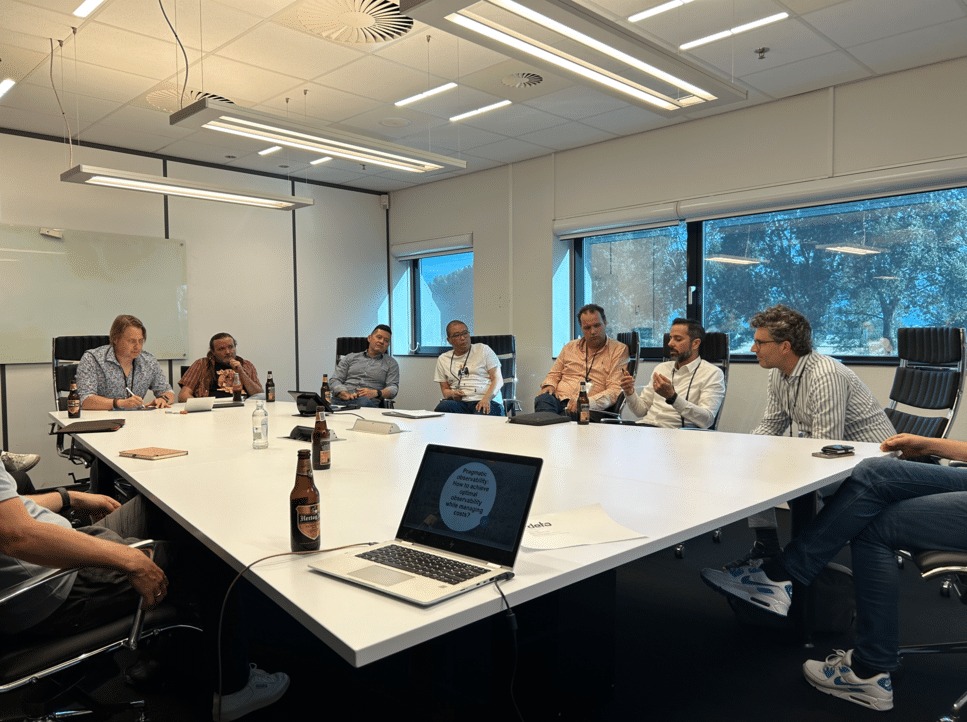In this interview, Benjamin Hanrieder, CTO at Engel & Völkers Technology, discusses the company’s digital transformation, software development practices, and the role of the Cloud Platform Team in ensuring reliable and secure infrastructure.
Mat Roche (MR): Can you give us an overview of your background?
Benjamin Hanrieder (BH): Hi Mat, nice to meet you. I grew up in Munich, but in the winter you would mainly find me skiing in the Alps on the weekend. After graduating from university (Physics, TUM, later Mathematical Finance, Oxford) I started as a consultant at d-fine, a small consulting company focussing on IT projects in banks and insurances. Although I was developing a lot in my freetime (at that time my favourite languages were C++ and Matlab) this was my first “professional” experience with doing software development. As a consultant we mainly filled the gap between IT and business. We helped bankers to fulfil their regulatory requirements by building up ETL pipelines to normalise & report hundreds of different banking products to the regulator. I then joined BCG where I was mainly looking at IT startups, helping investors to evaluate the IT organisation, people, development-processes and of course the IT projects in order to make an investment decision. This was a very intensive time, as I learned a lot about how companies work that grew from zero to ~200 employees in just a few years. After leaving d-fine I would not have imagined that I would work in the banking sector again, however a previous colleague asked me if I would like to take over the role of the Head of IT at a freshly founded startup by Check24 – the C24 bank. This was one of the most intensive experiences for me. We built up a bank from scratch and received the banking licence from BaFin in record time. This meant for me building up several agile scrum IT teams to develop various products for the bank (using Java and Angular), such as, a fully automated consumer loan application, approval, payout and collection engine, ETL pipelines that connects 25+ IT systems inside and outside the bank and the self made CRM system.
MR: Can you give us an overview of Engel & Völkers? And also Engel & Völkers Technology and the role EVT plays within the group?
BH: Engel & Völkers is a family owned and operated company founded in 1977. With ~15.000 agents working for us we are one of the most successful real estate companies in the world. In 2021, shortly before I joined, the majority of Engel&Völkers was acquired by Permira, a PE investment company, focusing on buying established traditional companies, and creating value by digitally transforming them to make them even more successful. Since then, we are in the driving seat to transform a low-tech real estate company into a modern prop-tech company. We started to hire 60+ highly qualified engineers & product managers to help us build new applications from scratch for Engel&Völkers. I believe that to build the most successful applications, you need to test & develop them together with the users. One of the first applications we developed was the CRM system “EVA”. We started to roll it out only after 3 months of development to the first users and since then continually improved it. Now, 1.5 years later, more than 5000 users are using this application every day. We have two large software departments, one for the mentioned CRM system and one for the customer facing website, where we will deliver a modern platform for our customers soon. Most of our software we develop inhouse. We mix and match the developed software with third party tools such as Twilio or Storyblok to reduce the time-to-market, while still being able to deliver bespoke customer journeys. We are 100% in the cloud, use kubernetes and modern CI/CD systems to deliver our Java and React/NextJS applications to our customers. As we have very short software iterations, as we release often, in some teams multiple times per day.
MR: On a personal note, after many successful years in the tech industry, what made you make the move to Engel & Völkers?
BH: Haha, to be honest: I needed a new challenge. We just finished building the C24 bank and shifted from being a high speed software development machine to a company that focuses on optimisations & stability. An investor of Engel&Völkers, which I knew from previous engagements, told me about this exciting new opportunity to transform a low-tech company into a high-tech proptech company. How could I say no? Honestly, it is a rewarding experience to build up something from scratch. I’m very grateful to have received this opportunity to work together with so many smart and motivated people and what we have accomplished until now.
MR: How would you describe the culture within EVT?
BH: Culture is something difficult to describe in words. I always recommend coming to our offices, talking with our engineers, team leads and product people during the interview process to get a better feeling about who we are. Generally we are proud that our teams consist of members from all over the world (Germany, Nepal, China, Portugal, Brasil, India, Belarus, Ukraine and many more) having various backgrounds. Also, we try to mix our development teams, and form a team out of developers with different backgrounds, product manager, UI/UX designers so that they can combine their strengths to deliver the best product. Finally our flat hierarchies allow everyone to have a large impact on the strategy and development of our company. You can imagine us as a startup inside an established company. This allows our team members to one the one side build products from scratch with high freedom of execution and on the other hand gives the financial security and work/life-balance of a well performing established company.
MR: Whats your vision for the Cloud Platform Team at EVT?
BH: The Cloud Team is managing the backbone of our applications. 1000s of VMs and 100s of databases are part of the IT Systems of Engel & Völkers. I believe that to be able to manage this amount of infrastructure, it’s necessary to build up a reliable and scalable cloud landscape using infrastructure-as-code tools such as Terraform or Terragrunt, as well as advanced monitoring, alerting, logging and tracing tools. As we are currently transitioning from having outdated applications to this new landscape, the cloud team plays a crucial role in defining and executing best practices so that developers have a reliable platform to build and deploy their software. Security-by-design gets more and more important in this fast evolving world. We are investing heavily in measures to secure and protect the data of our customers using our cloud infrastructure. As a gatekeeper we protect our infrastructure using modern technologies such as WAF, network security & peerings, hardware-tokens to access privileged systems, code scanners and more.




